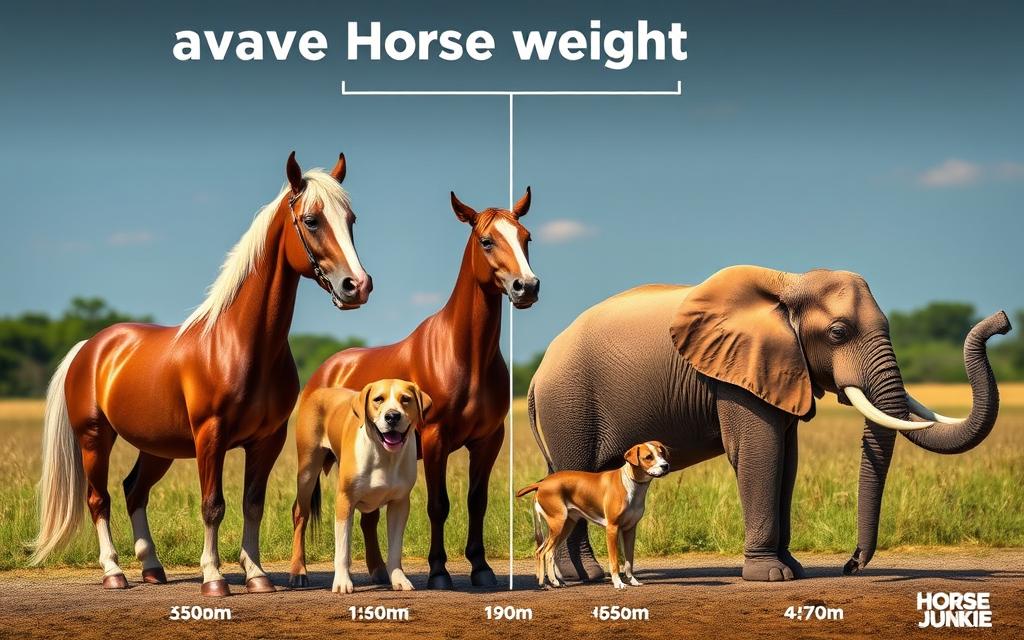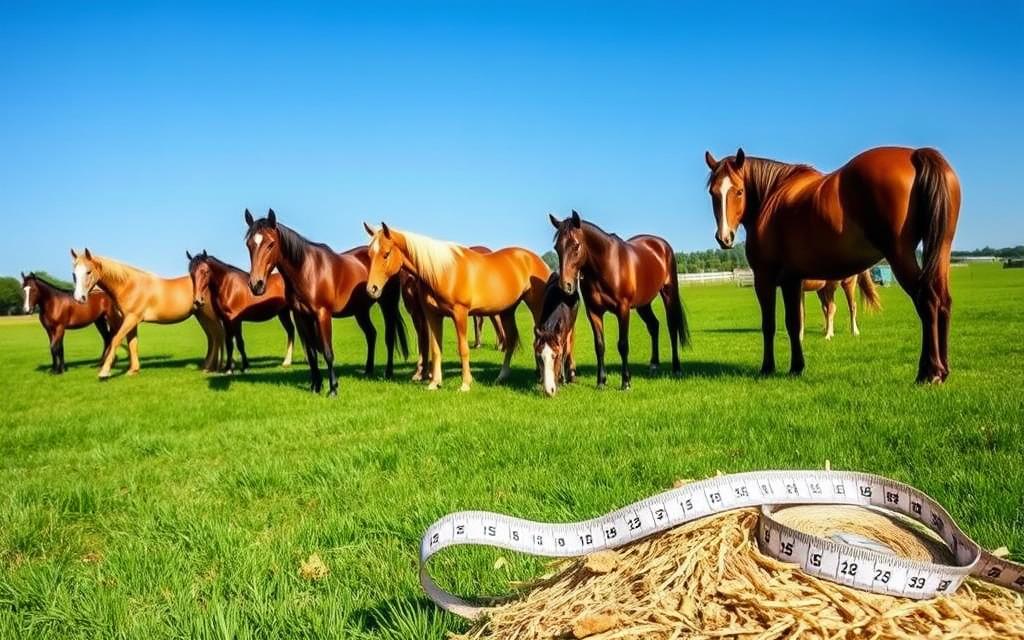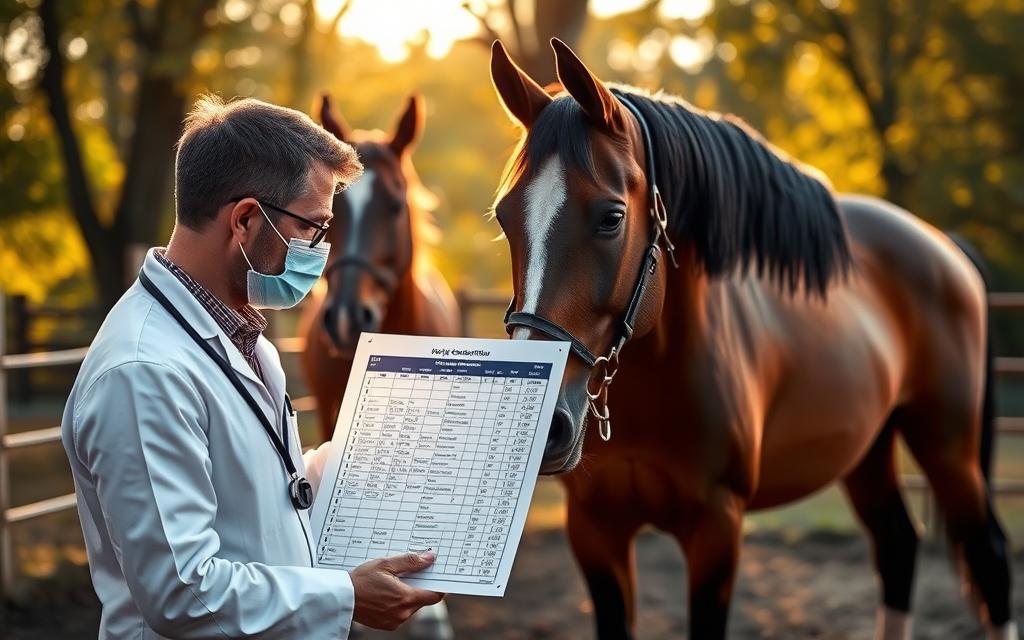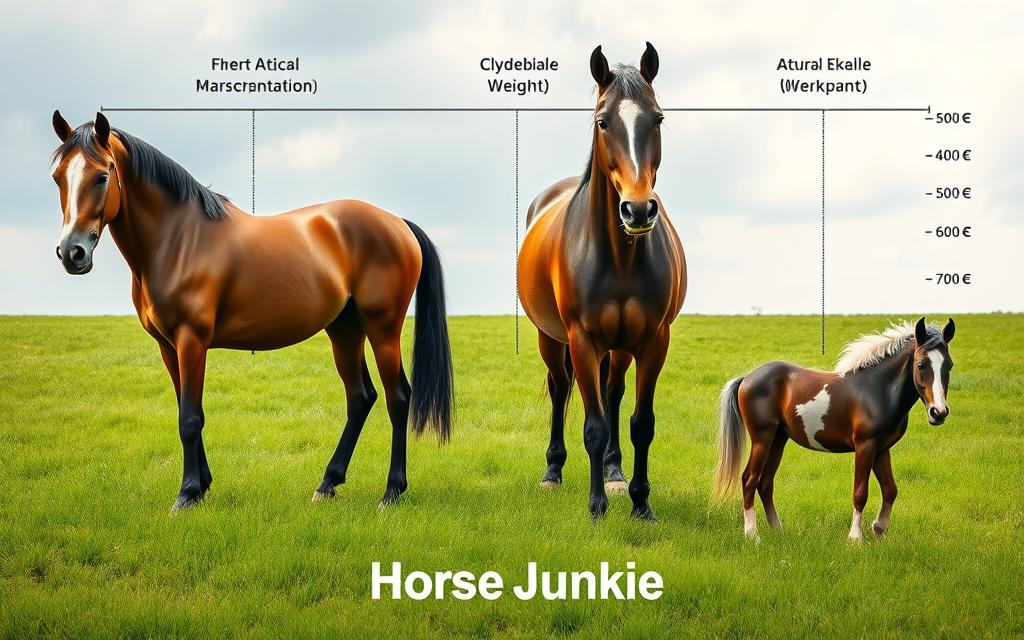Average Horse Weight: A Detailed Guide

Ever thought about how much the average horse weighs? It can change a lot based on breed and age. Knowing about equine weight is key for taking good care of horses. They usually weigh between 900 and 2,200 pounds.
But, things like breed, age, and health can make a big difference. In this guide, we’ll look into the average horse weight. We’ll see why knowing this is important for keeping horses healthy.
Key Takeaways
- The weight of mature horses ranges from 900 to 2,200 pounds.
- Draft horses, like the Belgian draft horse, can exceed 2,500 pounds.
- Thoroughbreds typically weigh between 900 and 1,200 pounds.
- Foals are born around 100 pounds and can double their weight in their first year.
- Older horses may require special nutritional adjustments to maintain a healthy weight.
- Understanding an individual’s weight can aid in effective diet and exercise planning.
Understanding Horse Weight Categories
Horses are grouped by weight to show their unique traits and uses. They are mainly divided into three categories: light horses, heavy horses, and draft horses. Each group has special features that affect their roles in different equestrian activities.
Light Horses
Light horses weigh between 900 and 1,400 pounds. They are known for their quickness and agility. This makes them great for riding, racing, and other competitive events. Breeds like the Thoroughbred and Quarter Horse are examples, showing a variety of sizes and abilities.
Heavy Horses
Heavy horses, like the Clydesdale, weigh between 1,800 to 2,200 pounds. They are famous for their strength and big size. These horses are mainly used for farm work and heavy hauling. Their strength is key for tough tasks, making them vital in some equestrian fields.
Draft Horses
Draft horses are a part of the heavy horse group, built for pulling heavy loads. They share the weight of heavy horses but can vary in size and weight. The Shire and Percheron are examples, showing the power needed for hard labor roles.
Factors Influencing Horse Weight
Understanding what affects a horse’s weight is key to caring for them. Three main factors are breed, age, and health.
Breed
The breed of a horse greatly influences its weight. Different breeds have unique traits that affect their size and weight. For example, draft horses can weigh over 1,800 pounds, while miniature horses weigh between 88 and 198 pounds.
Knowing the expected weight of a breed helps us provide the right food and exercise. This ensures each horse gets what it needs.
Age
A horse’s age and weight are closely linked. A newborn foal weighs about 10% of its mother’s weight. They can double their birth weight in just weeks.
By the end of their first year, they should weigh around 50% of their adult weight. Knowing this helps us set realistic goals and adjust our care.
Health
A horse’s health greatly impacts its weight. Conditions like Equine Metabolic Syndrome or Cushing’s disease can cause weight changes. Regular vet visits and health monitoring are crucial.
Proper nutrition and exercise tailored to a horse’s health are vital. This helps maintain the ideal weight for each horse.

The Average Weight of Common Breeds
Knowing the average weight of horse breeds helps us care for them better. Each breed has its own traits that affect their weight. Let’s look at the average weights of Thoroughbred, Quarter Horse, and Arabian horses.
Thoroughbred
Thoroughbred horses usually weigh between 900 to 1,200 pounds. They are known for their speed and lean body. This makes them great for racing and other sports.
Quarter Horse
Quarter Horses typically weigh 950 to 1,300 pounds. They are strong and versatile. They do well in rodeos and ranch work.
Arabian
Arabian horses usually weigh 900 to 1,100 pounds. They are known for their endurance and spirit. This makes them perfect for long rides.
Weight Measurement Techniques
Knowing how to measure a horse’s weight is key for their health. We can use different methods, like a weight tape or the scale method. These help us keep an eye on our horses’ well-being.
Using a Weight Tape
Measuring with a weight tape is easy. We wrap the tape around the horse’s girth. Then, we use the tape’s length and the horse’s girth to guess their weight. It’s great for quick checks when we can’t use a scale.
Scale Method
The scale method gives us the most accurate weight. When a horse steps on special scales, we get their exact weight. Regular checks with scales help us see if their weight changes. This ensures we give them the right care and food.

Comparing Horse Weight with Other Animals
Looking at the weight of horses compared to other animals helps us see what makes each special. Ponies and donkeys are two types of equines that show us interesting things about their weights and roles in our lives.
Weight of Ponies
Ponies are usually smaller than horses and weigh between 300 to 900 pounds. Breeds like Shetland Ponies weigh between 397 and 441 pounds. Despite their size, ponies are strong and useful in many horse activities. This makes their weight important for owners and handlers.
Differences with Donkeys
Donkeys are different from horses in weight. They weigh between 400 and 1,000 pounds, which is more than many ponies. Some big donkey breeds can even weigh more. These weight differences affect their jobs, moods, and roles in work and fun activities. Each type of animal adds something special to the world of horses.

The Importance of Maintaining Healthy Weight
Keeping our horses at a healthy weight is key for their health and performance. We need to watch their diet and make sure they get enough exercise. It’s also important to check their body condition score regularly. Every horse is different, so we must tailor our care to meet their unique needs.
Weight Management Strategies
Good weight management can help avoid many health problems. Here are some key steps:
- Diet Control: Giving the right mix of hay, grains, and supplements is crucial for balanced nutrition.
- Exercise: Regular exercise keeps muscles toned and supports metabolic health.
- Routine Assessment: Regularly checking body condition scores is vital. They should be between 4 and 6 on a 9-point scale.
By following these steps, we can keep our horses healthy and reduce the risk of obesity or insulin resistance.
Health Risks of Underweight Horses
It’s also important to understand the risks of underweight horses. Horses that are too thin face many challenges. These include:
- Weakened Immune System: Thin horses have weaker immunity, making them more prone to infections.
- Organ Issues: They are at risk of organ failure due to lack of nutrients.
- Increased Disease Susceptibility: Thin horses are more likely to get sick, which can further harm their health.
Knowing these risks shows why keeping our horses at a healthy weight is so important.

How to Calculate Horse Body Condition Score
The Body Condition Score (BCS) is key for checking our horses’ health. It was created by Henneke et al. in 1983. This system helps us see how fat, muscular, and healthy our horses are. It ranges from 1 to 9, with 1 being very thin and 9 being very fat.
Knowing how to use this score lets us tell if our horses are too thin, just right, or too heavy. This helps us keep them in the best shape.
Scoring System Overview
The BCS has different levels:
- Scores of 1 to ≤ 3 show our horses are too thin.
- Scores from 4 to 6 mean they are in good shape.
- Scores of 7 or higher mean they are too heavy.
These scores help us spot health risks. For example, a BCS of 4 to 6 is best for most horses. Breeding mares and stallions should aim for 6 to 7 and 5 to 6, respectively. Performance horses do well at 4 to 5.
It’s also crucial to check our horses’ BCS regularly. Doing this every 4 to 6 weeks helps us catch any health changes early.
Adjusting Diet Based on Score (average horse weigh)
Changing our horses’ diet based on their BCS can greatly improve their health. We aim to avoid being too thin or too fat, which can cause serious problems. To get the right weight, we might need to adjust how much they eat, what they eat, and how much exercise they get.
Horses with scores above 7 are at higher risk of health issues like insulin resistance. They need special diets to stay healthy.

The Role of Nutrition in Achieving Ideal Weight
Nutrition is key to our horses’ ideal weight. Knowing the essential nutrients helps us create good feeding plans. A balanced diet supports growth, muscle, and health.
Essential Nutrients
Horses need various nutrients for health, including:
- Proteins: Important for muscle repair and growth.
- Carbohydrates: Give energy for daily tasks.
- Fats: Horses can digest up to 20% fat, but most diets have only 3-4%.
- Vitamins and Minerals: Vital for body functions and health.
Legume hay has more protein and calcium than grass hay. It’s great for horses needing extra nutrients.
Feeding Guidelines
Creating a feeding plan depends on our horses’ age, weight, and activity. They should eat 1.5-2.5% of their body weight daily. For example, a 1,100-pound horse needs 16.5-27.5 pounds of food each day.

It’s important to regularly check body condition scoring (BCS). A BCS of 4 to 6 is healthy. Adjusting diets and exercise based on BCS prevents health problems. Talking to a vet helps ensure our horses get the right nutrition without too many calories.
Common Misconceptions About Horse Weight
Understanding common misconceptions about horse weight is key to proper care. Many think a heavier horse is always healthier. But, obesity can cause serious health problems. It’s important to manage weight and know the difference between health and weight.
Each breed has its own weight needs. So, it’s crucial to consider these to keep our horses healthy.
Myths vs. Facts
Myths about horse weight can confuse us. One myth is that underweight horses are always starving. But, they might have health issues instead.
Weight changes in horses can vary. They depend on age, diet, and exercise. By clearing up these myths vs. facts, we help our horses stay balanced and healthy.
Weight Fluctuations
Weight changes in horses are normal and shouldn’t worry us right away. They can change due to seasons, diet, or exercise. We should check our horses’ weights often to spot big changes.
Knowing these natural changes helps us avoid overreacting. It ensures we give our horses the right care for their needs.

Conclusion: Understanding Our Horses’ Weight
Knowing our horses’ weight is key to their health and how well they perform. We need to watch their weight closely to make smart choices about their food, exercise, and care. This way, we can catch problems early and help our horses live longer, healthier lives.
Importance of Regular Monitoring
Regular checks are essential to understand our horses’ weight. Each horse is different, based on their breed, age, and health. Using body condition scoring helps us see how fat they are and keep them at the right weight.
This careful approach helps us avoid problems like being too thin or too heavy. It keeps them healthy and prevents issues like insulin resistance or joint problems.
Encouraging Responsible Care
Teaching responsible care is crucial when it comes to our horses’ weight. We should give them the right food and exercise for their needs. This helps keep them physically and emotionally healthy.
By learning about our horses’ weight and managing their care well, we create a great place for them to thrive. Our commitment to their well-being makes a big difference in their lives.
FAQ
How much does the average horse weigh?
What factors influence a horse’s weight?
What are the weight categories for horses?
How do I measure my horse’s weight accurately?
What is the average weight of specific horse breeds?
What nutritional factors should I consider for weight management in horses?
How can I assess my horse’s body condition?
What are common misconceptions about horse weight?
How does horse weight compare to that of ponies and donkeys?
Why is it important to maintain my horse’s healthy weight?
Source Links
- How Much Does a Horse Weigh? — The Equine Institute
- How Much Does a Horse Weigh?
- Horse Height & Weight: A Guide
- How much does a horse weigh? (Fun facts, calculator, FAQs)
- A Comprehensive Guide on How Much Does A Horse Weigh
- How much does a horse weigh?
- How Much Does a Horse Weigh? Find Out Now!!!
- How Much Does a Horse Weigh? (Average Horse Weight Chart)
- How Much Does a Horse Weigh? With Breed Chart | PangoVet
- How Much Does a Horse Weigh?
- How Much Does a Horse Weigh? | Strathorn Farm Stables
- How Much Does a Horse Weigh | How Much Does a Average Horse Weigh
- The Body Condition Score
- Equine new placement only (proof).indd
- Horse Body Condition Scoring | Purina Animal Nutrition
- The Basics of Equine Nutrition
- Horse Weight Factors and Importance | American Horse Trails
- How Much Does A Horse Eat?
- Unveiling the Mystery: HOW MUCH DOES A HORSE WEIGH? Explained in Detail
- Let’s Talk About Weight — Charleston CARES
- How Much Does a Horse Weigh | How Much Does a Average Horse Weigh
- How Heavy Is A Full-Grown Horse? [Stats About How Much Horses Weigh]






